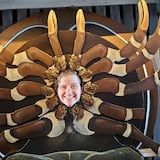
Jes Burns
Jes Burns works for OPB's Science & Environment unit as a science reporter and producer of the Northwest science show “All Science, No Fiction.”
She previously worked for the NPR affiliate KLCC in Eugene as a reporter and the local "All Things Considered" host. Jes has also worked as an editor, host and producer for Free Speech Radio News and has produced radio and television stories for national news programs, including“Marketplace” and “PBS NewsHour.” She’s won many awards for her reporting, including a 2020 AAAS Kavli Science Journalism Award.
Jes has a degree in English literature from Duke University and a master's degree from the University of Oregon's School of Journalism and Communications.